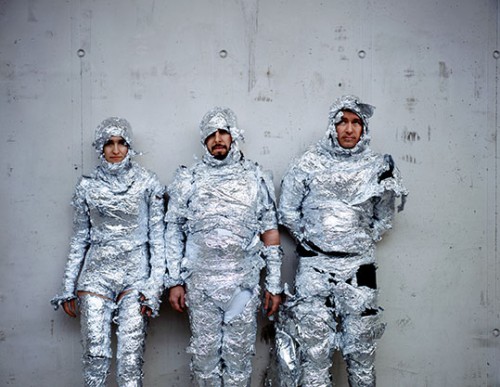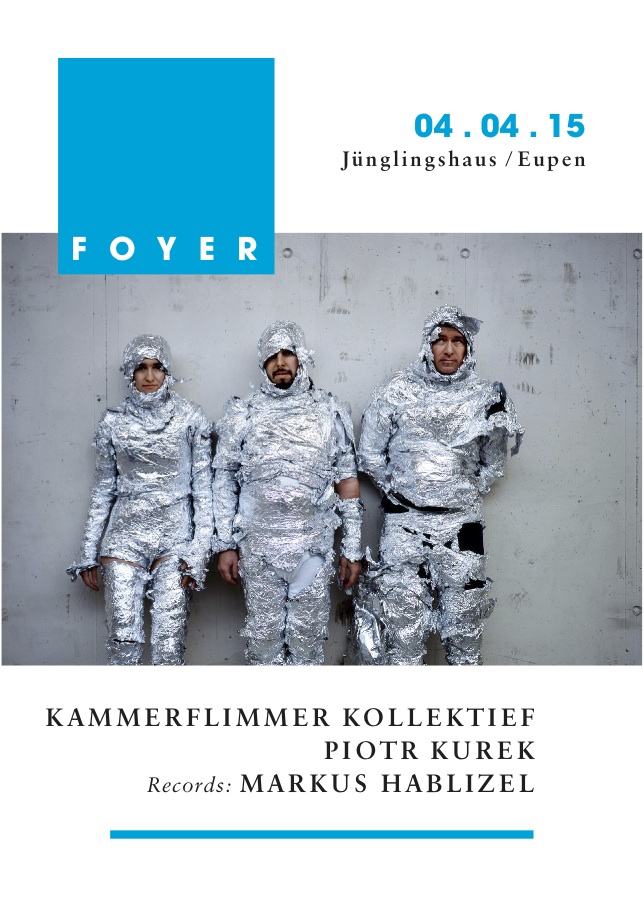
[sharify]
Kammerflimmer Kollektief
(Staubgold – Karlsruhe)
The story so far …
It all began in a bright storage room of the Upper-Rhenish poet’s museum in Karlsruhe in the mid-nineties: With old-skool equipment and an overdose of FMP & Wu-Tang, the first sketches of what would later be released under the nom-de-guerre “Kammerflimmer Kollektief” were conceived. I felt like a group of one. The resource as well as the raw material was my record collection; the result appeared in 1999 under the titled Mäander on the Weilheim-based payola-label. A simulation of jazz with pop appeal (melodies!). “Instrumental drones & central European freakouts on violins and reeds. A kind of European down home NoWave” was what Matt ffytche in The Wire called it.
At first, a live realisation seemed unthinkable. As it happened, the people necessary for such an undertaking gravitated towards the Kollektief in a very short time and without having been summoned. They were Johannes Frisch on the double bass; Dietrich Foth on a variety of saxophones; Heike Wendelin on the violin; Michael Ströder on drums and Anne Vortisch at the synthesizer. The tracks of the first album were the point of departure for our joint excursion; the result was a concert tour and a huge and wild chaos, which in turn was documented at the Uphon Studio in Weilheim and released as a CD (Incommunicado, 2000, again on payola). It included “Venti Latir”, our version of a song by Robert Wyatt, one of our great heroes and: one of the greatest soul singers ever. “Music is a chance for self development. It‘s another life, in which it‘s easier to develop the art of giving” – which is how John Stevens put it in the liner notes for Karyobin, the epoch-making first LP of the Spontaneous Music Ensemble from 1968. Felix Klopotek in German music magazine Spex, said it thus: “Listening to this music, it seems that free jazz as being played by, say, Pharaoh Sanders and Cecil McBee in 1969 has been put into a context where it meets and mingles with pop and electronics with consistency and effortlessness.”
The third album, Hysteria, was released in Japan and the USA in 2001 and subsequently on Quecksilber in 2004. It was a hybrid of its two predecessors; a synthesis of solo work in the studio and a collective flush. Martin Büsser wrote about it in testcard: “As of now, I am not aware of any better interaction of jazz and electronic music as this brief but most sophisticated album of the Kammerflimmer Kollektief. In this crossover between the great Free Jazz-tradition (Alan Silva, early Charlie Haden), Kraut- and free form-rock (Third Ear Band, Neu!) and the blurring of sounds of This Heat, it is not only the points of reference which are correct, but something that is much more important and even rarer: their new and inspiring combination.”
In 2002, changes were taking place within Kollektief: Michael Ströder & Anne Vortisch left; the remaining core was augmented by Heike Aumüller – who hitherto had been in charge of the artwork – on harmonium (as well as playing an active role in soundprocessing and songwriting) and Christopher Brunner on drums & vibraphone.
Ingeborg Bachmann wrote this about cicadas: “They stopped eating, drinking and loving to be able to sing forever.” But not only do they sing, they also help human beings to play the right notes: Cicadidae, the fourth album, was released in 2003 on the committed Staubgold label – as have all other releases since. The borders between analogue and digital, acoustic and electronic elements became more and more blurred. Somebody called it “Karlsruhe Psychedelic”. Ulrich Kriest in Intro magazine had this to say: “After presenting us with sketches, the Kammerflimmer Kollektief now grants us the view of the whole picture. It is a collage. It is very probable that we will not get to hear a more profound album this year. The music of the future realised today. And from Karlsruhe. Who would have thought of it?” And Dietmar Dath composed the most beautiful liner notes: “Here everything is heaven, but different from the origin. Up above are birds that hang on different kinds of jet streams with their heads down, not to be interchanged. The sun is shining, but it’s not really the sun: it’s the moon. When did night fall, anyway?”
What followed were numerous gigs at festivals and in clubs across of Europe (all of which were splendidly organised by our agency Planet Rock and all of which we survived unscathed).
The music learned to function in a multitude of rooms as well as under blue skies. In the open air, “the birds sing their blank melody outside. The sing as if conscious of companionship, now alone as if to the pale blue sky; the sing passionate songs addressed to one ear only and then stop. Birds swooped and circled high up in the air. Some raced in the furrows of the wind and turned and sliced through them as if they were one body cut into a thousand shreds.” (Virginia Woolf).
2005 saw the release of Abscencen, the fifth album. Here, sampling was reduced to a mere haze; almost everything had been played live and subsequently merged, processed and arranged at the computer. For this album, the sextet was augmented by the wind players Helmut Dinkel & Pirmin Ullrich and Martin Siewert, steel guitarist extraordinaire, noted for his work with amongst others Trapist & The Year Of. “Absencen is a tapestry woven from many and diverse translucent threads. The side that we behold is shimmering in a holy manifoldness, while from beholding it we can anticipate and construct the averted side. After all, we are not only endowed with the ability to hear, but also to think.” (Markus Hablizel) In Spex, Frank Eckert diagnosed: “The excessive energy inherent in this music never erupts but always remains inkling and insinuation. This absence of an explosion, this ecstasy which remains subliminal has congealed into a mild melancholia. Yet this music is so placatory and accessible in an immediate way, never is it bitter or malicious. Rarely has music been so obscenely rich, so exuberant, so recalcitrant in its details and at the same time so dark, so full of sentimentality, so full of feeling and so excessively longingly.”
From 2004 on, we performed live not only with the sextet, but also in diverse smaller line-ups. The most enduring of those proved to be the trio consisting of Heike Aumüller, Johannes Frisch and me. With our eyes shut tight, it provided us with a lot of room for excursions and turned out to be a fertile ground for new developments and experiences. The music became more and more organic, the interplay more intuitive.
Jinx, the sixth and current album has been recorded largely in the Electric Avenue Studio in Hamburg by Tobias Levin (remember to listen to Reformhölle by Cpt.Kirk&!). It is a result of the many concerts which have been performed in the trio format. It is based upon improvisations on bass (Johannes Frisch), harmonium (Heike Aumüller) and guitar (Thomas Weber), which were modified and augmented with obverdubs at the computer. Moreover, singing can be heard: Heike’s voice fishes truncated words from the sound – in best scat-tradition. Shaman Doo-Wop! Guests were Martin Siewert (again) from Vienna on a variety of string instruments and Harald Kimmig at the violin. Also, Dietmar Dath provided another set of brilliant liner notes. (Remember to read Dirac!) As usual, the allusions are numerous, among them a reference to legendary hannoverian psychedelic group 39 Clocks and, well, the Jinx. As Lou Reed sang in his epic song “Street Hassle”: “Some people got no choice/ And they can never find a voice/ That they could even call their own/ So the first thing that they see/ That allows them the right to be/ Why, they follow it/ You know what it’s called?/ Bad luck.”
In 2009 the garden awoke with Dietmar Dath. Text became music, music became legible.
Dietmar Dath, whose novels, non-fiction books and newspaper articles are systematically subverting, overflying, galloping through and crisscrossing the boundaries of genres and imagination, wrote „Im Erwachten Garten“ (“In The Awoken Garden“), a hitherto unpublished looking glass text to his polyphonic novel “Die Abschaffung der Arten“ (“The Abolition Of The Species“), while we did the music & the ambience. In it, animals explain the meaning of love, war and history to human beings. „Im Erwachten Garten“ is a key to a secret original text which lies beneath the published novel. There are two voices: That of the text and the other one, which whispers, susurrates, cooes, like a whitsun flamlet. And it is precisely this voice, which relates the substance of the text. Truer words have not been spoken: “denn bei der regelrechten Liebe machen nicht die Regeln die Liebe, sondern die Liebe macht die Regeln.”
2010 belongs to Wildling, you and the night and the music. “Delire goes marchin’ in, desire forever.” The fire ain’t out yet, baby!
www.discogs.com/artist/38153-Kammerflimmer-Kollektief




